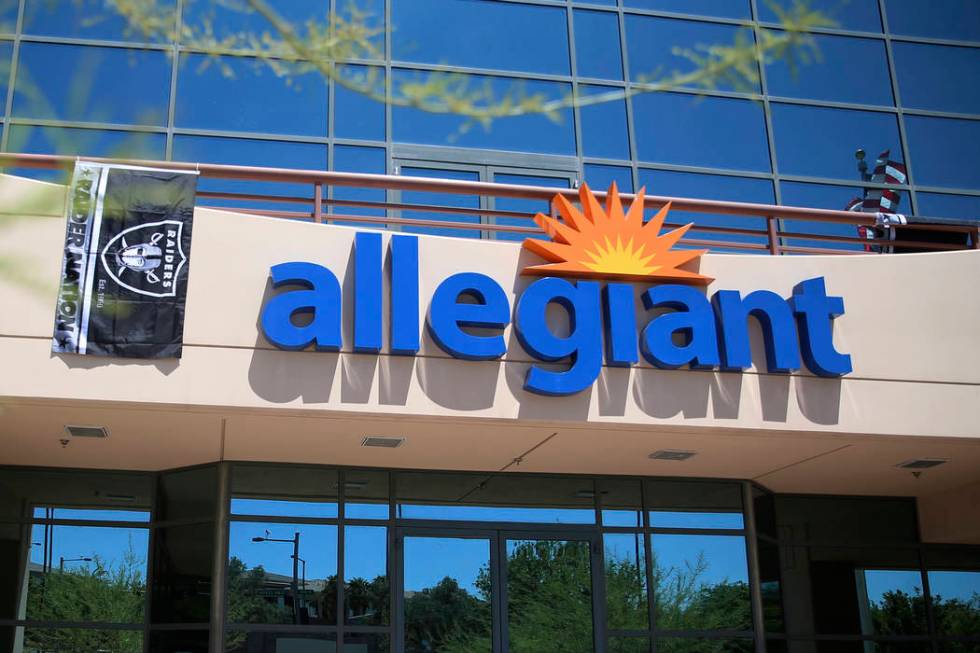Allegiant sees benefits from Las Vegas stadium deal

As the rebel of the NFL, the Raiders may have found an ideal partner for the naming rights to Las Vegas’ 65,000-seat indoor stadium in Allegiant Air.
Like the Raiders, Las Vegas-based Allegiant is a maverick in aviation with unconventional strategies that disrupt what customers have come to expect from airlines. While major carriers focus on business customers whose expense accounts can afford high fares, Allegiant hones in on the thrifty leisure traveler.
Some don’t like the unbundled menu of ancillary services passengers buy when they fly Allegiant. Some call it nickel-and-diming the customers; Allegiant views it as passengers paying only for what they want and notes the charges are almost always wrapped around a low base fare. Over time, Allegiant customers have changed the way they travel, becoming more economically minded. Allegiant once carried an average 1.1 bag per passenger; today, it carries 0.5.
It’s possible some sports fans had to do a Google search to find out what Allegiant is.
More than likely, their searches brought up the airline’s turmoil in 2015 with mechanical breakdown issues and labor unrest. Newspapers and “60 Minutes” reported about its troubles long after the company set out to fix its problems, a turnaround that Chairman and CEO Maury Gallagher affectionately refers to as “Allegiant 2.0.”
One result of Allegiant 2.0 is that the company was able to make the bold step of sponsoring an NFL venue, giving the company an opportunity to tell its story to a national audience thanks to the name recognition Allegiant will get on Sundays and in prime time.
Allegiant can afford the price tag, estimated at between $20 million and $30 million a year for up to 30 years. Gallagher wouldn’t disclose the exact numbers in an interview last week and said he has no plans to make them public.
What are public are the company’s quarterly results. For the first six months of 2019, Allegiant showed net income of $127.7 million. It’s easily one of the most profitable airlines flying, with the best margins in the business.
The growth trajectory also is impressive. Gallagher expects revenue to surpass $2 billion by next year. Five years ago, it was at $1 billion.
The most noticeable change with the airline has been the 100 percent turnover of its fleet, going from older, gas-guzzling McDonnell-Douglas MD-80 jets to newer, more fuel-efficient Airbus A320s and A319s.
That change alone has improved reliability. In July, Gallagher said, Allegiant had three mechanical disruptions on more than 10,000 flights, for a 99.9 percent controllable completion rate.
The company is using big data to predict when something will break on an airplane, storing more spare parts and training mechanics how to prepare for mechanical issues that would ground an aircraft and damage its credibility with customers.
Most of the improvements Gallagher’s team has generated are data-driven, and the benefits of placing the Allegiant name on the stadium will drive even more data the company’s way, enabling new marketing options through the Raiders and their affiliates.
Allegiant flies to 120 cities and has database access to 275 million people within 45 minutes of an airport served by the airline.
Gallagher, a former Bay Area resident and Raiders fan, is enthused about what the naming-rights deal means for the company’s future. The airline is nimble enough and will have access to game tickets to be able to add flights to bring more fans of the Raiders or their opponents to Las Vegas. That means more room nights in local resorts and meals in Las Vegas restaurants.
The NFL believes the fan intensity level is greater in some of the small cities Allegiant serves than in their hometowns. That makes sense: What else is there to do on a Sunday afternoon in McAllen, Texas, than watch and cheer for the Cowboys? In Dallas, there are plenty of other attractions competing for that entertainment dollar.
While Hawaiian Airlines has the Raiders’ charter business contracted for the 2019 season, Gallagher said, it isn’t beyond the realm of possibility that Allegiant could become a team charter operator in the future. Hawaiian has the advantage of flying wide-bodied jets that are comfortable enough for 6-6, 275-pound linemen. Gallagher said his company could explore reconfiguring one of its planes to make for a comfortable charter flight.
In the meantime, Allegiant could look at other charter flying opportunities for fans wanting to attend a game in Las Vegas.
“It’s another step — a big step — toward being a customer-centric travel company,” Gallagher said of the naming-rights deal. “If you’re thinking of leisure, we want you to think of Allegiant. What more leisurely event is there on a Sunday afternoon than watching football or going to a football game? So we’ve bound ourselves at the hip with those guys (the Raiders).”
Contact Richard N. Velotta at rvelotta@reviewjournal.com or 702-477-3893. Follow @RickVelotta on Twitter.